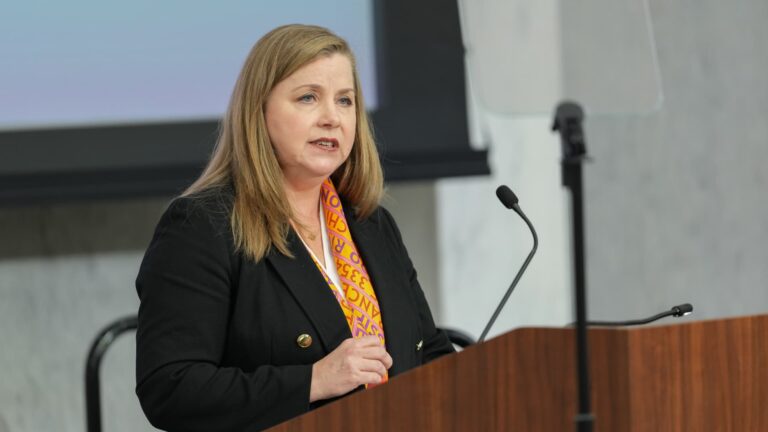Michelle Bowman, Vice Chair for Oversight, Federal Reserve Board of Governors, during the Federal Reserve Board Community Banking Conference, Thursday, October 9, 2025, in Washington, DC, USA.
Eric Lee | Bloomberg | Getty Images
Regulators will scrap a controversial rule requiring banks to plan for losses in the event of climate-related events, according to an announcement Thursday.
The Federal Deposit Insurance Corp., the Office of the Comptroller of the Currency and the Federal Reserve System said in a joint release that they believe the requirement is no longer necessary because it overlaps with other provisions banks have in place to prepare for emergencies and extraordinary situations.
“The Agency believes that principles for managing climate-related financial risks are not necessary because the Agency’s existing safety and soundness standards require all supervised entities to have effective risk management commensurate with their size, complexity, and activities,” a joint release from the three regulators said.
Fed Director Michael Barr, a former vice chair for oversight, issued a statement opposing the move.
“Despite growing climate-related financial risks, withdrawing the principles is short-sighted and will increase risks to the financial system,” Barr said in a statement.
mission creep
Trump administration officials have accused the Fed of falling prey to mission creep and overstepping its monetary policy and banking supervisory responsibilities. Climate change provisions enacted in October 2023 were also criticized.
Chairman Jerome Powell has repeatedly said that climate is not a direct issue for the Fed. The rules required banks to list potential losses they could incur from climate-related issues as part of their regular examinations.
Michelle Bowman, the Trump appointee who replaced Barr as the Fed’s banking supervisor, praised the move to roll back the rules as part of an effort to “refocus the supervisory process on significant financial risks.”
“Rescinding the climate principles is an important step in this process,” Bowman said. “The impact of this guidance has been to create confusion about supervisory expectations and increase compliance costs and burdens without commensurate improvements in the safety and soundness of financial institutions or the financial stability of the United States,” he said.
Bowman said that while he recognizes the risks posed by climate change, the Fed’s mission “doesn’t extend to developing climate change policy.”


